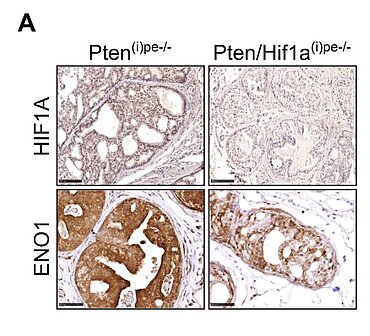Prostate cancer: new leads for diagnosis and treatment
In a study published in the journal Science Advances, scientists highlight the central role of hypoxia factor 1 alpha (HIF1a) activation in the progression of prostate precancerous lesions, as well as the effectiveness of its inhibition in slowing tumor progression. In addition, they identified a prognostic biomarker of relapse after prostatectomy. These results open up promising perspectives for patient treatment.

Prostate cancer is the most common cancer in men and the 3rd most common cause of cancer-related death in industrialized countries (source INCa, 2022). Surgical or radiotherapy management of localized forms of prostate cancer allows the cure of a large number of patients, but can affect their quality of life. However, the PSA (prostate specific antigen) blood test currently used for diagnosis does not discriminate between indolent and malignant tumors. In addition, current therapies for metastatic stages induce numerous side effects, and have limited efficacy due to the development of treatment resistance.
As prostate cancer develops over several decades, biomarkers that allow early identification of tumors at high risk of recurrence and strategies that prevent or slow the development of aggressive tumors could avoid surgical interventions and resistance to current therapies.
In this paper, scientists map the different cell types during the evolution of precancerous lesions in mouse models of prostate cancer, using state-of-the-art techniques to characterize gene expression at the single cell level. Thus, they demonstrate that precancerous prostate glands are rapidly starved of oxygen, leading to the activation of the hypoxia factor HIF1a. The latter will modulate the metabolism of prostatic epithelial cells as well as the recruitment of immune cells, and induce the transformation of prostatic epithelial cells into cancerous cells. Moreover, the researchers show that the inactivation of this factor slows down the evolution of tumors. Finally, this work identifies TGM2 as a biomarker of high risk of relapse after prostatectomy.
Thus, this study opens new perspectives for a better management of prostate cancer patients.
